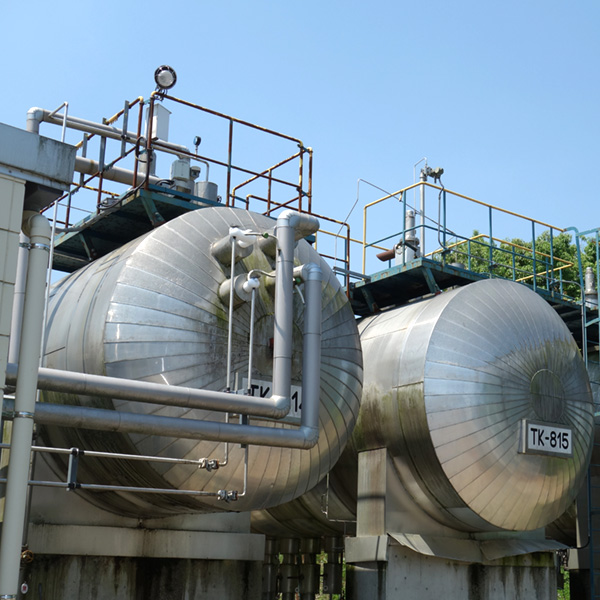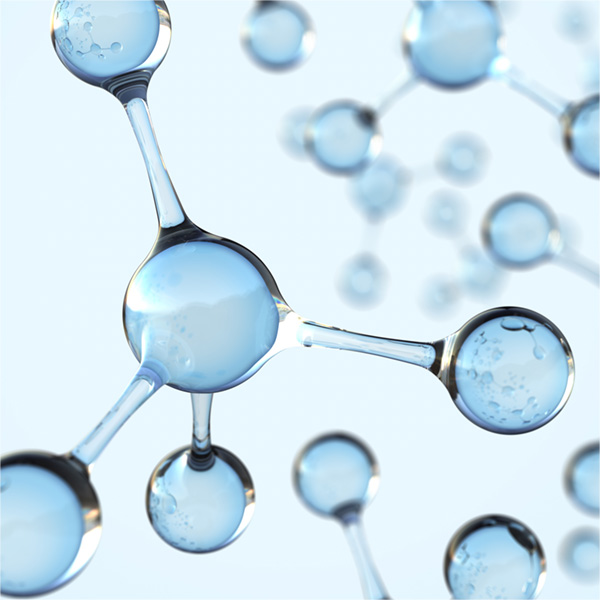
Sustainability
Sustainability
- HOME >
- Sustainability >
- Sustainability >
- Materiality and SDGs
Materiality and SDGs
Our materiality identified in FY2018 was established after considering both of its importance to the Company and to our stakeholders. In FY2022, when the our mid-term business plan "Vista2027" was launched, we conducted a review of this materiality. With the start of "Vista2027 Stage II" in FY2025, we revised some of the targets for FY2027 and major initiatives to better align with the ideal state our group aims to achieve by FY2027.
Aiming for the sustainable development of both society and our group, we have positioned these KPIs as indicators of sustainable management and promoting initiatives while managing progress annually.
Materiality Identification Process
1. Gain Understanding About Social Issues and Social Changes
Social issues and social changes looking ahead to 2050 and issues to be addressed by Nissan Chemical were discussed across the Company in the “Business Planning Project” led by the President and the Vice President, and it was confirmed that there have been no major changes in social issues and social changes since the previous formulation.
Social Issues and Social Changes

2. Review of Materiality and Materiality Factors
With reference to evaluation items of ESG-related evaluation organizations such as SDGs, DJSI, and FTSE, and sustainability information disclosure guidelines such as SASB, we reviewed materiality and materiality elements based on the risks and opportunities of the Company. As a result, the Company has determined that materiality identified in the previous medium-term management plan" "Vista2021" "remains an important issue for the Company. On the other hand, in light of the priority of Nissan Chemical’s business base and the results of our activities under Vista2021, we have added “safety and disaster prevention” as a new materiality factor, and summarized into 30 materiality factors.
3. Management of Impact on Our Group
In regards to the 30 materiality factors, we considered and analyzed the social issues and social changes, and then made arrangements to manage the impact on the Group.
4. Exchange of Opinions with Directors and Audit & Supervisory Board Members, including Outside Officers
From the perspective of incorporating outside opinions, we exchanged opinions in intensive discussions with directors and audit & supervisory board members, including outside officers, regarding the materiality and materiality factors that had been reviewed in the Business Planning Project.
5. Identification of Materiality and Materiality Factors (through resolution at the Board of Directors)
The Board of Directors confirmed and resolved the appropriateness of the materiality, materiality factors, and key performance indicators (KPIs) for each materiality factor, which were identified based on the discussions in the Business Planning Project and the opinions of the officers.
Materiality

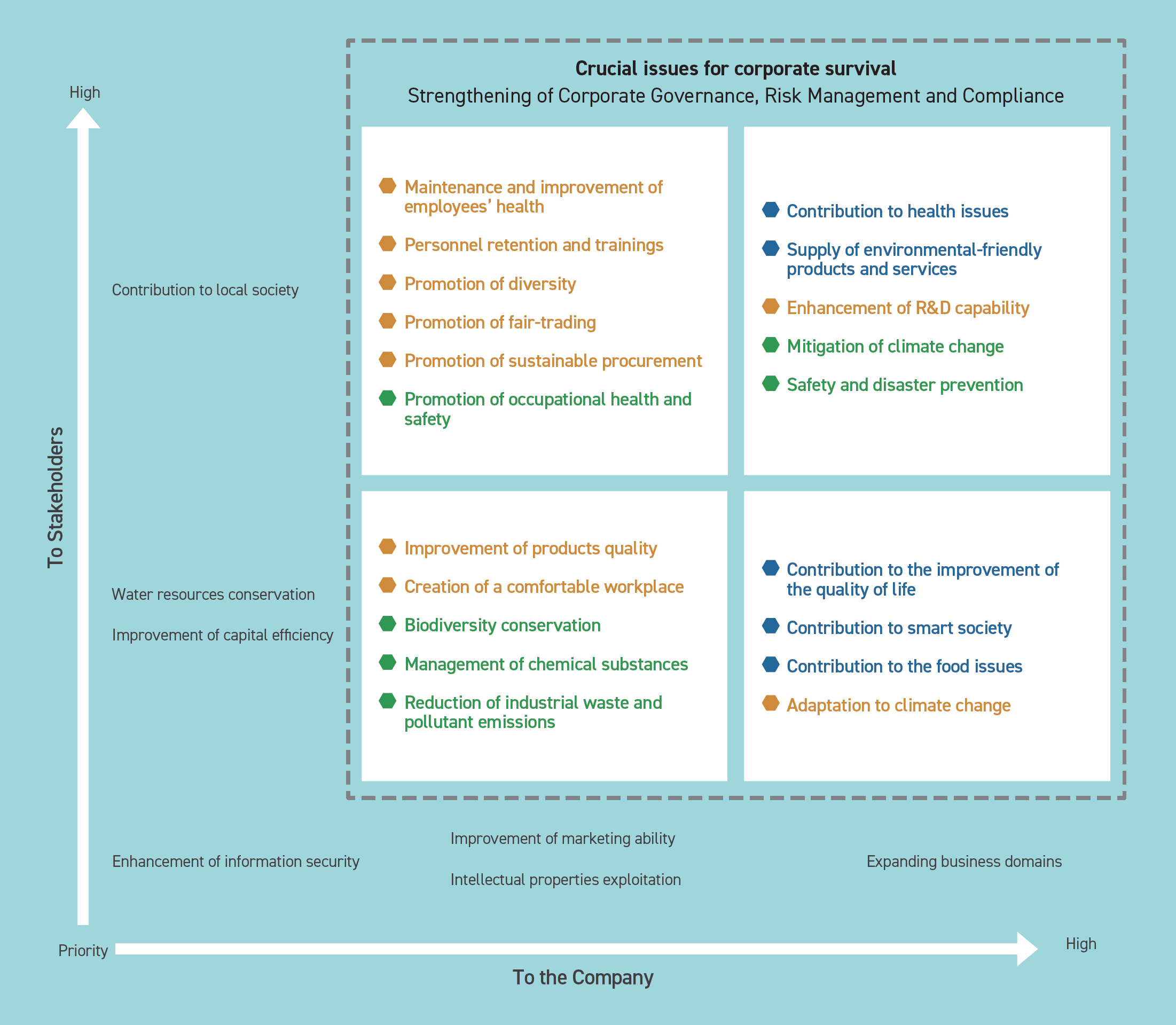
Efforts for Materiality and KPIs
| Materiality | Materiality Factor | Major Initiatives | Target for FY2027 | FY2024 Result | Relevant SDGs |
|---|---|---|---|---|---|
| Provision of New Value for Helping to Enrich People’s Lives | Supply of environmental-friendly products and services | ・Develop materials that contribute to the expansion of renewable energy ・Develop materials that contribute to the achievement of a circular economy ・Reduce the application amount of agrochemicals ・Introduce recyclable packaging materials ・Supply exhaust gas removal materials ・Supply disinfectants for water purification tanks ・Supply materials that enable reduction of oil and fat waste |
Net Sales: +10% | ・Net sales: +5% compared to FY2021 | 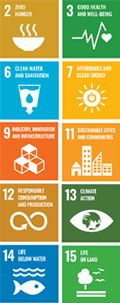 |
| Contribution to smart society | ・Supply materials that contribute to higher capacity/speed of data communication and sensing | Net Sales: +60% | ・Net sales: +33% compared to FY2021 | ||
| Contribution to food issues | ・Supply agrochemicals to increase crop yields and conserve agricultural labor in food production ・Contribute to the maintenance of health of livestock |
Net Sales: +25% | ・Net sales: +27% compared to FY2021 | ||
| Contribution to improvement of the quality of life | ・Supply disinfectants for drinking water ・Contribute to maintaining the health of companion animals |
Net Sales: +15% | ・Net sales: +48% compared to FY2021 | ||
| Contribution to health issues | ・Supply generic drugs ・Offer contracted manufacturing and service for pharmaceuticals ・Develop materials for regenerative medicine market ・Develop drugs for intractable diseases |
Net Sales: +5% | ・Net sales: +7% compared to FY2021 | ||
| Rate of total sales of products and services that contribute to solving social issues in consolidated net sales Nissan Chemical Sustainable Agenda |
60% or more | 60% or more | |||
| Strengthening of Nissan Chemical’s Business Base | Enhancement of R&D capability | ・Utilization of Informatics to enhance the efficiency and speed of R&D ・Expand core technologies |
Total number of patent applications (FY2022 to 2027): 2,500 | ・Cumulative number of patent applications since FY2022: 1,190 (FY2024: 425 patent applications) |
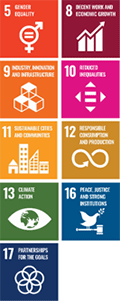 |
| ・Ratio of themes utilizing informatics: At least 10% ・Number of patent inventions: 1,200 (FY2022 to FY2027) |
(New targets from Stage II) | ||||
| Improvement of products quality | ・Prevent serious complaints ・Prevent quality fraud and data tampering |
・Number of serious complaints: 0 ・Attendance rate of quality education : 100% ・Rate of correct answers on comprehension tests: At least 90% ・Rate of answer "Increased awareness of fraud prevention" :100% |
・Number of serious complaints: 3 ・Attendance rate of quality education : 100% ・Rate of correct answers on comprehension tests: at least 90% ・Rate of answer "Increased awareness of fraud prevention" :100% |
||
| Maintenance and improvement of employees' health | ・Promote measures against lifestyle-related diseases ・Implement mental health measures ・Conduct awareness activities for employees on maintaining their health ・Promote female's health |
Rate of employees within appropriate weight※:At least 70% ※BMI (body mass index): 18.5 to 25.0 |
・66.9% | ||
| Creation of a comfortable workplace | ・Promote work-life balance ・Implement measures against harassment ・Provide support for childcare and nursing care, encourage male employees to take parental leave |
Utilization rate for annual paid leaves: At least 80% | ・82.2% | ||
| Personnel retention and trainings | ・Introduce a new personnel system (role evaluation system) ・Strengthen career development ・Enhance self-development support programs |
Positive response rate in survey of employee attitude on human resource development: At least 65% | ・60% | ||
| Promotion of diversity | ・Promote female's activities ・Recruit international students ・Promote employment of persons with disabilities |
・Proportion of females in the regular position: At least 13% ・Proportion of female researchers: At least 18% |
・Proportion of females in the regular position: 12.2% ・Proportion of female researchers in the regular position: 18.1% |
||
| Promotion of fair-trading | ・Hold in-house training sessions, and conduct other educational and awareness activities ・Conduct compliance educational and awareness activities |
・Zero violations of antitrust laws ・Zero bribery of foreign public officials |
・Number of violations of antitrust laws: 0 ・Number of bribery of foreign public officials: 0 |
||
| Promotion of CSR procurement | ・Provide feedbacks on results of sustainable procurement survey ・Provide supports in improvement for suppliers that don’t meet the Company’s standards |
Provision rate of supports in improvement for suppliers that don't meet the Company's standards: At least 90% | ・100% | ||
| ・Response rate of sustainable procurement questionnaire : At least 90% | (New targets from Stage II) | ||||
| Adaptation to climate change | ・Maintain and improve the resilience of business activities in the event of natural disasters | Update and maintain BCPs for products that account for 50% of ordinary income | ・Updated or maintained BCPs for products that account for 81% of ordinary income | ||
| Continuous improvement of responsible care activities | Mitigation of climate change | ・Reduce GHG emissions | GHG emissions: Reduce by at least 30% compared to FY2018 | △23.5% | 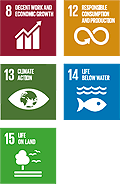 |
| Promotion of occupational health and safety | ・Strengthen occupational safety management | ・Zero accidents requiring staff time off from work ・Number of occupational accidents: Reduce by half compared to FY2020 |
・Number of accidents requiring staff time off from work: 1 ・Number of occupational accidents: 3 (FY2020: 8) |
||
| Biodiversity conservation | ・Promote biodiversity conservation activities | Establish and operate Bio-Parks at Nissan Chemical’s plants | ・Established the Nagoya Plant Bio-Garden (Establishment and operation completed at all Nissan Chemical's plants) |
||
| ・Number of Registered "Nationally Certified Sustainably Managed Natural Sites":At least 2 sites ・Support for government-owned land":5,000m2 or more |
(New targets from Stage II) | ||||
| Management of chemical substances | ・Comply with laws and regulations regarding the use of chemical substances | Continue zero serious violations of laws and regulations | ・Number of serious violations of laws and regulations: 0 (maintained) | ||
| Reduction of industrial waste and pollutant emissions | ・Reduce industrial waste and pollutant emissions for final disposal | Reduce final disposal ratio at Nissan Chemical's plants (compared to FY2020) | ・8.5% (FY2020: 14.3%) | ||
| Final disposal volume:Reduce by 50% compared to FY2021 | ・Reduced by 40.4% from FY2021 level (New targets from Stage II) |
||||
| Sasety and disaster prevention | ・Strengthen the management of safety and disaster prevention | ・Zero fires, explosions and chemical spills ・Zero safety accidents |
・Number of fire: 0, Number of explosions: 0, Number of chemical spills: 1 ・Number of safety accidents: 1 |
||
